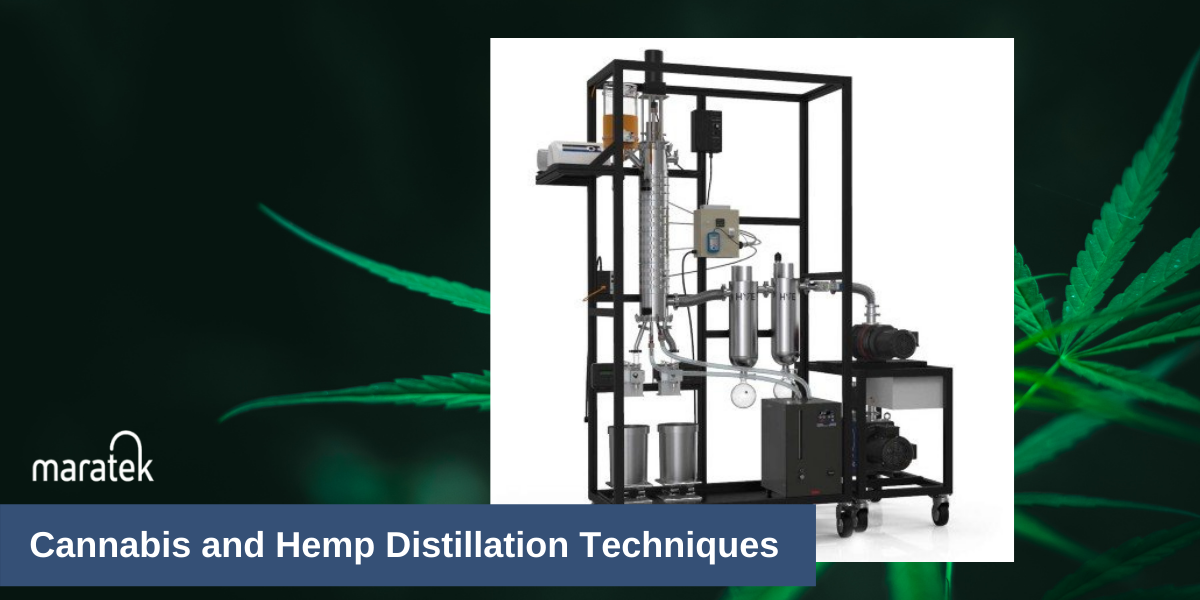What are the Cannabis and Hemp Distillation Techniques?

Distillate is one of the purest products containing only the THC and CBD molecules, and has many applications across the cannabis industry.
Removed in the cannabis and hemp extraction and winterization process are most fats, waxes and lipids that form the plant profile of the cannabis or hemp plant. After this process, however, a wide variety of terpenes and cannabinoids remain, as well as a small percentage of fats, waxes and lipids that slipped through the filtration process.
Distillation is a post-production process that aims at removing these factors - which all impact purity, potency, and volatility - and isolating the desired cannabinoids.
The THC and CBD molecules have high boiling points which means the molecules stay intact when heated at a high temperature. For some of the other undesirable compounds, a much lower boiling point is required to convert them to a gas - meaning that a machine designed to collect and remove the vapors produced, and leave you with a final product that consists of up to 99 percent pure THC or CBD, is required.
This process is borrowed from the production of things like essential oils. Botanicals like lavender undergo a similar process to produce a liquid compatible to put on your skin or in your diffuser. For cannabis and hemp, this means that the final product is decarboxylated and less volatile so it can be, for example, heated in a vape and consumed.
Cannabis and hemp distillation techniques
The short-path method
One of the most common forms of distillation in cannabis and hemp production is the short-path method.
You start with a crude oil and heat it until it vaporizes where it enters a fractional tube and then a condensing tube before entering into another flask. The material is separated into “heads”, “tails” and “main”.
The “main” is a much higher concentrate of the desired cannabinoid and the “heads” and “tails” are all those other materials that have now been boiled off. The short-path method uses small batches and experienced operators to ensure that the temperatures are kept at a desired level. This makes the short-path method ideal for smaller operations.
Wiped film distillation
Wiped film distillation uses the same concept of boiling off unwanted solvent or terpenes but in a different set up. The crude oil is “wiped” along the outside of a heated cylinder. This means that all the product is heated evenly so that undesirables boil off at a similar rate. The vapors are then condensed back to a liquid and collected.
This process is run a couple of times to ensure a high-quality product. A wiped film unit can be set up to run continuously, increasing its productivity and scalability.
Maratek carries both short-path and wiped-film distillation units in varying sizes to suit the needs of our customers from a small-scale lab setting to a full production facility.
Why is distillation important in the cannabis and hemp industry?
The purity and potency of distillate makes it very valuable. The oil produced is pure, clear, and smooth. After all the extras, like terpenes and volatiles, have been removed, what purpose do we have for such a product?
Distillate is mainly used in vapes, in edibles or consumed as a liquid dropper-style. Now, since the terpenes, or flavors, of the oil have been removed, the taste can be manipulated to be more appealing to customers.
At this point, the desired terpenes can be added back into the distillate to manage the final flavour. Mango gummies and mint dab pens sell much better than products with a cannabis, plant like, flavor.
The process of distillation allows for much more customization and consistency in your final product. It is significantly easier to predict potency and how the product will taste to the final consumer.
While removing terpenes makes the product tasteless and odorless, some believe that the process of removing terpenes also eliminates some of the medicinal benefits. Ultimatley, it's all up to the end-consumer and what they are wanting in their cannabis products. CBD distillate is often used to control pain and help customers relax, while THC distillate is mostly used recreationally.
Post processing techniques, like distillation, provide an abundance of control over the look, feel, smell and taste of the final product. Distillation allows for a more comprehensive customization of the end product.
Want to learn more? Contact Maratek today and find out how we can help with your company’s distillation process.




